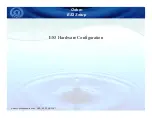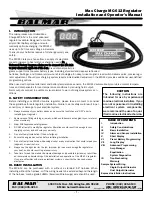
v
Elevation
: Difference between your current altitude and the
altitude when you started the chronograph (requires GPS-3D
Sensor).
Chronograph Mode example
Assume that you run regularly, and you want to gain information
about your current workout routine so that you can set fitness
goals for yourself. You use Chronograph Mode to record lap time
for each of the three stages of your workout. When you finish
your workout, use the lap information to determine distance and
pace, both per lap and as a total of all three laps. If you ran uphill
for part of your workout, you can also determine your elevation
to learn how far you climbed. With your current fitness level in
mind, you can then set realistic fitness goals for yourself and
monitor your progress on a regular basis.
27
TO OPERATE CHRONOGRAPH MODE HANDS-FREE
You can set Chronograph Mode to start when you begin moving
and to stop when you stop moving or to automatically take splits
based on either distance or elapsed time. See “Hands-free
settings” on page 63.
TO VIEW PERFORMANCE DATA IN CHRONOGRAPH MODE
When using Fitness Sensors with your Watch, scroll through
performance data by pressing and releasing
DISPLAY
.
Performance data viewing options for Chronograph Mode include:
v
Heart Rate
: Current heart rate (requires HR Sensor).
v
Speed
: Current velocity (requires GPS-3D Sensor).
v
Average Speed
: Average velocity for the period that
chronograph has been running (requires GPS-3D Sensor).
v
Pace
: Current velocity, expressed in minutes per selected
distance unit, such as miles or kilometers (requires GPS-3D
Sensor).
v
Average Pace
: Average per-minute speed for the period that
chronograph has been running (requires GPS-3D Sensor).
v
Distance
: Distance traveled since the chronograph was started
(requires GPS-3D Sensor).
v
Altitude
: Current height above sea level (requires GPS-3D
Sensor).
26
Summary of Contents for Fitness Sensors
Page 2: ......
















































